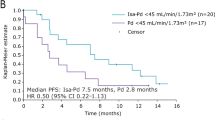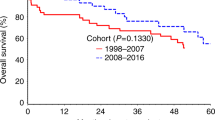Abstract
Data on the effectiveness and toxicity of high-dose melphalan in patients with renal impairment (RI) are lacking. We evaluated the impact of RI on outcomes of patients with multiple myeloma treated with melphalan 200 mg/m2 (Mel200) and autologous stem cell transplantation. Similar baseline characteristics were seen among 46 patients with creatinine clearance (CrCl) <60 mL/min (median 50 mL/min, range 20–59) and 103 patients with CrCl ⩾60 mL/min (median 83 mL/min, range 60–128). Patients with CrCl <60 mL/min had longer time to neutrophil (P=0.008) and platelet engraftment (P<0.001). Diarrhea, duration of total parenteral nutrition use and infection were significantly higher in the CrCl <60 mL/min group. With a median follow-up of 35 months (range 2–132) in the CrCl <60 mL/min group and 47 months (range 1–45) in the CrCl ⩾60 mL/min group, overall survival was comparable between the two groups. Median treatment-free survival was longer in the RI group (37 vs 17 months, P=0.0025). Multivariate analysis showed CrCl <60 mL/min (hazard ratio (HR) 3.5), and prior proteasome inhibitor therapy (HR 2.441) both predicted longer treatment-free survival. We consider Mel200 safe and effective in patients with CrCl between 30 and 60 mL/min.
This is a preview of subscription content, access via your institution
Access options
Subscribe to this journal
Receive 12 print issues and online access
$259.00 per year
only $21.58 per issue
Buy this article
- Purchase on Springer Link
- Instant access to full article PDF
Prices may be subject to local taxes which are calculated during checkout



Similar content being viewed by others
References
Dimopoulos MA, Terpos E, Chanan-Khan A, Leung N, Ludwig H, Jagannath S et al. Renal impairment in patients with multiple myeloma: a consensus statement on behalf of the International Myeloma Working Group. J Clin Oncol 2010; 28: 4976–4984.
Augustson BM, Begum G, Dunn JA, Barth NJ, Davies F, Morgan G et al. Early mortality after diagnosis of multiple myeloma: analysis of patients entered onto the United Kingdom Medical Research Council trials between 1980 and 2002—Medical Research Council Adult Leukaemia Working Party. J Clin Oncol 2005; 23: 9219–9226.
Abbott KC, Agodoa LY . Multiple myeloma and light chain-associated nephropathy at end-stage renal disease in the United States: patient characteristics and survival. Clin Nephrol 2001; 56: 207–210.
Child JA, Morgan GJ, Davies FE, Owen RG, Bell SE, Hawkins K et al. High-dose chemotherapy with hematopoietic stem-cell rescue for multiple myeloma. N Engl J Med 2003; 348: 1875–1883.
Attal M, Harousseau JL, Stoppa AM, Sotto JJ, Fuzibet JG, Rossi JF et al. A prospective, randomized trial of autologous bone marrow transplantation and chemotherapy in multiple myeloma. Intergroupe Français du Myélome. N Engl J Med 1996; 335: 91–97.
Mikhael JR, Dingli D, Roy V, Reeder CB, Buadi FK, Hayman SR et al. Management of newly diagnosed symptomatic multiple myeloma: updated Mayo Stratification of Myeloma and Risk-Adapted Therapy (mSMART) consensus guidelines 2013. Mayo Clin Proc 2013; 88: 360–376.
ALKERAN (melphalan) [package insert]. Aspen: St Leonards, NSW, Australia; GlaxoSmithKline: Research Triangle Park, NC, USA. Revised 31 July 2010.
Shah N, Callander N, Ganguly S, Gul Z, Hamadani M, Costa L et al. Hematopoietic stem cell transplantation for multiple myeloma: guidelines from the American Society for Blood and Marrow Transplantation. Biol Blood Marrow Transplant 2015; 21: 1155–1166.
Vesole DH, Tricot G, Jagannath S, Desikan KR, Siegel D, Bracy D et al. Autotransplants in multiple myeloma: what have we learned? Blood 1996; 88: 838–847.
Nieto Y, Vaughan WP . Pharmacokinetics of high-dose chemotherapy. Bone Marrow Transplant 2004; 33: 259–269.
Samuels BL, Bitran JD . High-dose intravenous melphalan: a review. J Clin Oncol 1995; 13: 1786–1799.
Grzasko N, Morawska M, Hus M . Optimizing the treatment of patients with multiple myeloma and renal impairment. Clin Lymphoma Myeloma Leuk 2015; 15: 187–198.
Reiter E, Kalhs P, Keil F, Rabitsch W, Gisslinger H, Mayer G et al. Effect of high-dose melphalan and peripheral blood stem cell transplantation on renal function in patients with multiple myeloma and renal insufficiency: a case report and review of the literature. Ann Hematol 1999; 78: 189–191.
Tosi P, Zamagni E, Ronconi S, Benni M, Motta MR, Rizzi S et al. Safety of autologous hematopoietic stem cell transplantation in patients with multiple myeloma and chronic renal failure. Leukemia 2000; 14: 1310–1313.
St Bernard R, Chodirker L, Masih-khan E, Jiang H, Franke N, Kukreti V et al. Efficacy, toxicity and mortality of autologous SCT in multiple myeloma patients with dialysis-dependent renal failure. Bone Marrow Transplant 2015; 50: 95–99.
Sirohi B, Powles R, Kulkarni S, Rudin C, Saso R, Rigg A et al. Glomerular filtration rate prior to high-dose melphalan 200 mg/m2 as a surrogate marker of outcome in patients with myeloma. Br J Cancer 2001; 85: 325–332.
Tricot G, Alberts DS, Johnson C, Roe DJ, Dorr RT, Bracy D et al. Safety of autotransplants with high-dose melphalan in renal failure: a pharmacokinetic and toxicity study. Clin Cancer Res 1996; 2: 947–952.
Carlson K . Melphalan 200 mg/m2 with blood stem cell support as first-line myeloma therapy: impact of glomerular filtration rate on engraftment, transplantation-related toxicity and survival. Bone Marrow Transplant 2005; 35: 985–990.
Badros A, Barlogie B, Siegel E, Roberts J, Langmaid C, Zangari M et al. Results of autologous stem cell transplant in multiple myeloma patients with renal failure. Br J Haematol 2001; 114: 822–829.
Knudsen LM, Nielsen B, Gimsing P, Geisler C . Autologous stem cell transplantation in multiple myeloma: outcome in patients with renal failure. Eur J Haematol 2005; 75: 27–33.
Bird JM, Fuge R, Sirohi B, Apperley JF, Hunter A, Snowden J et al. The clinical outcome and toxicity of high-dose chemotherapy and autologous stem cell transplantation in patients with myeloma or amyloid and severe renal impairment: a British Society of Blood and Marrow Transplantation study. Br J Haematol 2006; 134: 385–390.
Parikh GC, Amjad AI, Saliba RM, Kazmi SM, Khan ZU, Lahoti A et al. Autologous hematopoietic stem cell transplantation may reverse renal failure in patients with multiple myeloma. Biol Blood Marrow Transplant 2009; 15: 812–816.
Bodge MN, Reddy S, Thompson MS, Savani BN . Preparative regimen dosing for hematopoietic stem cell transplantation in patients with chronic kidney disease: analysis of the literature and recommendations. Biol Blood Marrow Transplant 2014; 20: 908–919.
Author information
Authors and Affiliations
Corresponding author
Ethics declarations
Competing interests
The authors declare no conflict of interest.
Rights and permissions
About this article
Cite this article
Sweiss, K., Patel, S., Culos, K. et al. Melphalan 200 mg/m2 in patients with renal impairment is associated with increased short-term toxicity but improved response and longer treatment-free survival. Bone Marrow Transplant 51, 1337–1341 (2016). https://doi.org/10.1038/bmt.2016.136
Received:
Revised:
Accepted:
Published:
Issue Date:
DOI: https://doi.org/10.1038/bmt.2016.136
This article is cited by
-
Clinical factors associated with autologous stem cell transplantation outcomes in multiple myeloma: upfront transplant with MEL200 remains the standard of care
Annals of Hematology (2024)
-
Autologous stem cell transplantation for multiple myeloma patients with chronic kidney disease: a safe and effective option
Bone Marrow Transplantation (2022)
-
Gastrointestinal toxicity of high-dose melphalan in autologous hematopoietic stem cell transplantation: identification of risk factors and a benchmark for experimental therapies
Annals of Hematology (2021)
-
Pretransplant hemoglobin and creatinine clearance correlate with treatment-free survival after autologous stem cell transplantation for multiple myeloma
Bone Marrow Transplantation (2019)
-
Patient eligibility for hematopoietic stem cell transplantation: a review of patient-associated variables
Bone Marrow Transplantation (2019)



